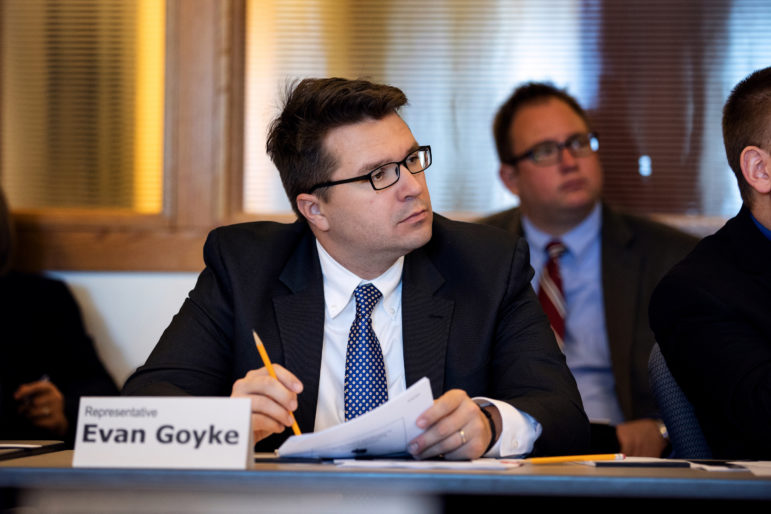County Sales Tax Legislation Gets Hearing
Bill supported by local business leaders allows hike in county sales tax for local purposes.
Legislation enabling Milwaukee County to implement a sales tax is getting its first hearing Thursday after being introduced last October.
The legislation, authored by State Rep. Evan Goyke, is the product of a years-long process led by Milwaukee County Executive Chris Abele and Board Chairman Theodore Lipscomb, Sr. to address the county’s fiscal crisis. It goes before the Assembly’s Ways and Means Committee Thursday.
Early in 2019, a work group developed a plan called the “Fair Deal for Milwaukee County”, which led to a coalition of local government leaders from 19 municipalities and local business leaders called “Move Milwaukee Forward”, which has lobbied the state Legislature to pass a law allowing the county to increase the sales tax by 1 percent. This increase, according to the local coalition, would net approximately $160 million annually.
The legislation has 17 sponsors and cosponsors, all Democrats. The two candidates for Milwaukee County Executive, Chris Larson and David Crowley, are both co-sponsors of the bill. It also has the support of the Greater Milwaukee Committee and the Metropolitan Milwaukee Association of Commerce. Both organizations lobbied on behalf of the bill.
The legislation in the Assembly calls for taking the proposed sales tax revenue and using 25 percent to reduce property taxes in Milwaukee County, with 7 percent to be spent on public health infrastructure in Milwaukee County and the remaining 68 percent of the revenue divided, with half going to Milwaukee County and the other half split up among the municipalities to be used on capital and operating expenses.
That last part, where the majority of the property tax revenue is going, is what got the ball rolling on this whole effort.
For at least a decade, the amount of money from Milwaukee County taxpayers going to state government has increased year over year, while the revenue that comes back to Milwaukee County from the state, under its shared revenue formula, has stayed flat or decreased. With annual inflation, the amount of money Milwaukee County has to run the government gets smaller year after year.
And on top of that, Milwaukee County has a structural budget deficit of more than $12 million. In 2020, the county was facing a budget gap of $28 million at the start of the budgeting process. There is also a massive backlog of capital projects and deferred maintenance, particularly in county owned parks, that could reach $1 billion by the end of the decade.
The non-partisan Wisconsin Policy Forum released a report in June expressing in stark terms the situation that Milwaukee County faces: “The enormity of the county’s infrastructure backlog indicates that both new funding and liquidation of assets will be required,” the report warns.
Over the past year, the fiscal crisis erupted in several areas of Milwaukee County government.
The Milwaukee County Board approved two unprecedented lease agreements in 2019 that leased part or all of two county-owned parks. The first was a portion of Washington Park leased to the Urban Ecology Center. Under the agreement the organization will finance the construction of a new $12 million boat house and also pay for $2 million worth of needed infrastructure improvements. The second was a 15-year-lease of Kulwicki Park to the City of Greenfield, transferring the cost for park improvements and maintenance to the city.
The 2020 budget included new funds for corrections officers, because in June the jail commander told the county board that uncompetitive pay was causing the jail to lose more guards than it could hire.
The legislation faces an uphill battle. The Republican-controlled Legislature has long been averse to tax hikes and legislation that helps the state’s Democratic stronghold, Milwaukee County.
A spokesperson for Assembly Speaker Robin Vos previously said the legislation would be a “tough sell.”
Legislation Link - Urban Milwaukee members see direct links to legislation mentioned in this article. Join today
If you think stories like this are important, become a member of Urban Milwaukee and help support real, independent journalism. Plus you get some cool added benefits.
Related Legislation: Assembly Bill 521
More about the 1 Percent Sales Tax Proposal
- The State of Politics: The Debate Over Local Sales Taxes - Steven Walters - Feb 22nd, 2021
- Evers’ Budget Proposal Would Allow Milwaukee Sales Tax - Jeramey Jannene - Feb 12th, 2021
- WCA Applauds Governor Evers’ Sales Tax Option - Wisconsin Counties Association - Feb 12th, 2021
- MMAC Encourages Support for Evers Sales Tax Proposal - Metropolitan Milwaukee Association of Commerce - Feb 12th, 2021
- Gov. Evers Proposes Plan to Enhance Local Control, Bolster Local Communities’ Economic Recovery - Gov. Tony Evers - Feb 12th, 2021
- The State of Politics: Milwaukee Leaders Plead for 1% Sales Tax - Steven Walters - Mar 16th, 2020
- County Sales Tax Legislation Gets Hearing - Graham Kilmer - Mar 5th, 2020
- ‘Fair Deal’ Sales Tax Referendum Blocked From April Ballot - Corrinne Hess - Jan 30th, 2020
- Transportation: Bauman Wants 1.5 Percent Sales Tax - Jeramey Jannene - Sep 26th, 2019
- Review Board to Discuss Recent Sales Tax Proposal and its impact on Public Transit - Ald. Bob Bauman - Sep 23rd, 2019
Read more about 1 Percent Sales Tax Proposal here
Political Contributions Tracker
Displaying political contributions between people mentioned in this story. Learn more.
- June 30, 2016 - David Crowley received $1,000 from Chris Abele
MKE County
-
Ron Johnson Says Free-Market Principles Could Fix Education
 Jul 17th, 2024 by Graham Kilmer
Jul 17th, 2024 by Graham Kilmer
-
RNC Will Cause Some County Services To Be Moved to Wauwatosa
 Jul 12th, 2024 by Graham Kilmer
Jul 12th, 2024 by Graham Kilmer
-
Hank Aaron State Trail Will Be Closed For RNC, State Fair
 Jul 12th, 2024 by Graham Kilmer
Jul 12th, 2024 by Graham Kilmer






















